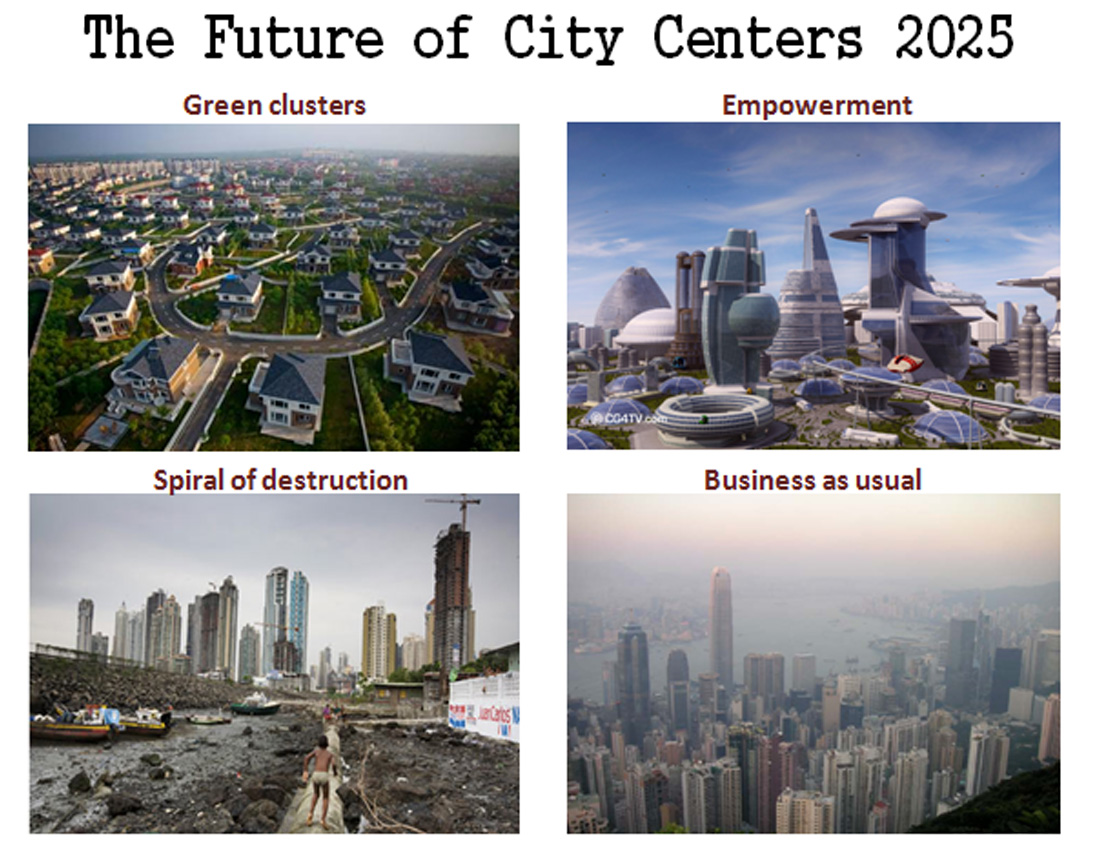Difference between revisions of "Future of the City Centre 2025"
| Line 91: | Line 91: | ||
====Technological Driving Forces==== | ====Technological Driving Forces==== | ||
[[Personal Rapid | [[Personal Rapid Transit� (PRT) and �Cybernetics Transportation System� (CTS) ]]<BR> | ||
[[Floating House]]<BR> | [[Floating House]]<BR> | ||
Latest revision as of 23:15, 1 November 2021
Group Members
Cole Carrigan
Eglantine Dang
Akcan Islamoglu
Fahad Nayyar
Louis Tzeng
Introduction
The city center is a place of special significance to communities and nations. Long the economic engine, the city center has change as technology has improved. Transportation, communication, and internet technologies has destroyed some city centers while enhancing others. Climate change, natural resources, green technology, immigration, and the financail crisis of 2008 will shape the city centers of the future. So what will city centre be like in 2025? What will a post-crisis center look like? Will it remain a meeting spot, with a business function? Will people continue to work in offices? Will centers decay and the land return to agricultural function like in Detroit, or will centers have a new lease on life and reinvent themselves through the green movement? The Future of the City Centre 2025 explores this question and provides a peek into what the future may hold.
Problem Owner:Sander de Iong, Secretary General Rotterdam IAB, EDBR
Scenarios
Drafts
Systems Diagram
Scenario Axis
Driving Forces
Political Driving Forces
Future of climate change negotiation
Environmental Driving Forces
Strain on Fresh Water Supplies
Societal Driving Forces
Increased demand for a higher quality of life
Increased need for young and educated immigration
Increase in Green Space within Cities
Economic Driving Forces
Technological Driving Forces
[[Personal Rapid Transit� (PRT) and �Cybernetics Transportation System� (CTS) ]]
Future of mobility (The Netherlands)
Increase use of biometrics such as Iris Scans
Research Questions
Why and where do people traditionally meet?
What are the existing forces challenging physical meetings in city centers?
Why do face-to-face meetings still matter?
What are the demographic trends in city centers?
What are the global population trends?
How does the crisis impact living and business activities in city centres?
What is the current climate / environment state of city centers?
How does transportation impact city centers?
Does globalization affect city center?
What is the current state of the world's water supply?
What will the population look like in 2025?
How does the political system in Western countries influence city development?
References
Pictures obtained from the following sources
Empowerment: http://3danimation.e-spaces.com/royalty-free-images.html
Green Clusters: http://www.treehugger.com/files/2009/04/china-plans-green-city.php
Spiral of Destruction: http://www.guardian.co.uk/books/2010/jan/09/whole-earth-catalog-book-review
Business as Usual: http://www.hkoutdoors.com/hong-kong-news/hk-air-pollution.html
